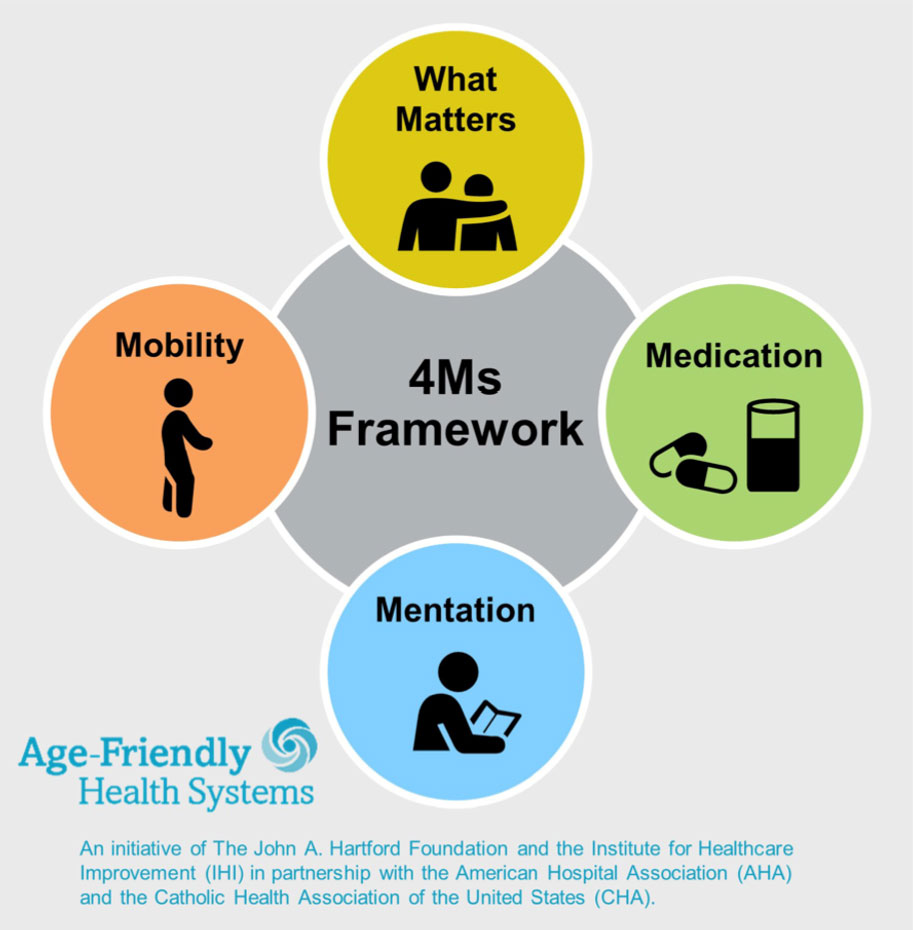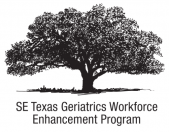Improving Care in the
Clinic and Community
An Age-Friendly Health System is one in which clinical care settings reliably implement four geriatric care practices (the 4Ms: What Matters, Medications, Mentation, Mobility) in a manner consistent with evidence-based best practice.
The practice of the 4Ms as “age-friendly” care recognizes the unique care considerations necessary for the high-quality care of aging adults.
Creating Age-Friendly
Health Communities
To practice the 4Ms of age-friendly care, clinics must reliably:
- Ask and document What Matters to older adults, then align the care plan accordingly.
- Review Medications and de-prescribe as many high-risk medications as clinically appropriate.
- Address Mentation by screening for depression and dementia, treating and referring to specialists when needed.
- Assess Mobility, then develop and implement a plan to maximize functional mobility.
Learn more about implementing the 4Ms in your care setting with these informative videos.
SETxGWEP develops education and training to promote the 4Ms in care for older adults. Many clinics use Medicare Annual Wellness Visits as a resource to ask and act on the 4Ms. SETxGWEP has developed a templated letter to patients and a clinic display poster to explain the value of an Annual Wellness Visit in the context of age-friendly care. Access a modifiable version of the templates that can be customized to your organization.
Other training to address common gaps in 4Ms care can be accessed from our Health Professionals Training page.

What Matters Most
Patient Priorities Care approach helps patients and clinicians focus all decision-making and healthcare on what matters most: patients’ own health priorities. This is particularly helpful for clinicians who are navigating the difficult task of making care decisions with their complex, older patients.
Patient Priorities Care is associated with an increase in care concordant with individuals’ preferences and a reduction in perceived treatment burden among older adults with multiple chronic conditions (MCCs).
To provide more options for helping individuals to identify their health priorities, the PPC team created and tested a self-directed process- MyHealthPriorities.org – to complement the health priorities identification process directed by health professionals.
For clinicians, the Patient Priorities Care Decisional Guidance tool provides steps and strategies for addressing common clinical scenarios and challenges in aligning care with patients’ health priorities (their health outcome goals they most want from their healthcare and their health care preferences – what they are, or are not, willing and able to do to achieve these outcome goals). The tool can be used to learn how to align clinical decisions with patient’ priorities and as a point-of-care reference tool.
Make your Clinic Age-Friendly
Join the 2,068 other clinics and health systems nationwide recognized as Age-Friendly Health Systems.
To support the widespread practice of age-friendly care, SETxGWEP works with primary care clinics in the region to assess their resources, priorities, and readiness to achieve formal designation from IHI as an Age-Friendly Health System. Through the process, the SETxGWEP team supports partner clinics to identify current practices in alignment with the 4Ms framework, provides training to address gaps in 4Ms care delivery and helps to implement workflows that reliably address the 4Ms with every older adult.

